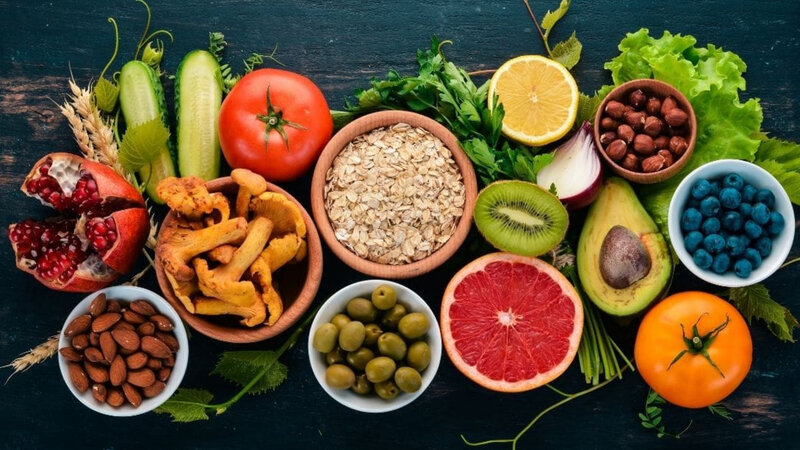Antioxidants Foods – It Reverses Wrinkles & Helps To Look Younger
A diet rich in natural antioxidants reduces inflammation, strengthens the immune system, and prevents cellular aging
The anxiety and uncertainty experienced during confinement due to the threat of Covid-19 have led to neglect of eating at a time when what the body needs most is to reinforce healthy habits. The striking increase in the consumption of ultra-processed foods, rich in sugars and saturated fats, reveals that way of dealing with stress, which we know as “emotional hunger”.
However, in recent days the interest in taking care of oneself again seems to have increased, both through food and exercise, coinciding with that slight relief that the entry into more permissive phases of confinement implies.
But to take care of our health, experts emphasize the importance of attending to nutritional concepts that really promote health. The study published in the national center for complementary and integrative health, reveals that the consumption of a diet rich in natural antioxidants is essential to reduce inflammation, strengthen the immune system, and prevent cellular aging that depresses it.
Especially in the case of the population at risk. As it explains, there is evidence that antioxidant nutrition makes the immune system work properly, so important in times of pandemic. This opinion is shared by Dr. Laura I. Arranz, professor in the Department of Nutrition, Food Sciences, and Gastronomy at the University of Barcelona
She emphasizes that just when we begin to expose ourselves more to sunlight, antioxidants are even more important because the tissues, especially those of the skin, need to be protected with vitamin A or beta-carotene, vitamin C, vitamin E, selenium, and other antioxidants such as lycopene, resveratrol, lutein, and zeaxanthin, etc.
In addition, Dr. Arranz adds that living in continuous stress and the fact that, in some cases, physical activity has been resumed requires an increase in antioxidants, which are achieved by eating plenty of fresh, seasonal, and raw fruits and vegetables, although also seeds and nuts.
This way of eating will make us feel better, the body will be stronger and the skin will better tolerate the sun. Furthermore, if we eat foods rich in antioxidants, we also guarantee a good intake of the vitamins and minerals we need, he reveals.
What are antioxidants?
Antioxidants are molecules capable of delaying or preventing the oxidation of molecules that are produced by the transfer of electrons from a substance to an oxidizing agent, as specified by Iñaki Elío, academic director of the Degree in Nutrition at the European University of the Atlantic.
He adds, “By losing electrons, these substances can become unstable and become free radicals, which react in a chain and can damage cells.” In fact, according to the expert, a diet low in antioxidants can accelerate aging and favor the appearance of certain types of cancer, as well as cardiovascular and metabolic diseases.
In addition, as he adds, for his part, it is not only important to take into account the importance of antioxidants, but we must prepare for possible outbreaks of coronavirus in the face of autumn because, as he says, it is at that time of year when the immune system may be more compromised.
Polyphenols, Carotenoids & Vitamins
How many types of antioxidants are there?
In general terms, antioxidants can be divided, as explained by Professor Elío, into three large groups: polyphenols, carotenoids, and vitamins of Group C and E.
1.Polyphenols
They are compounds of plant origin, with a powerful antioxidant capacity. They are found in many fruits and vegetables, as well as in other foods with which they are prepared. Some examples are blackberries, blueberries, grapes, apples, citrus fruits, onions, soybeans, peanuts, virgin olive oil, green tea, white tea, and coffee. The consumption of these foods, according to the expert, has been linked to the prevention of cardiovascular diseases and certain types of cancer.
2. Carotenoids
They are pigments manufactured by plants in the photosynthesis process, with the ability to neutralize the species that cause oxidative stress. Their colors range from yellow to red, although they can also be close to purple. Fruits and vegetables such as carrot, orange, peach, tangerine, tomato, watermelon, papaya, pumpkin, even spinach and broccoli (the latter is green because its chlorophyll content masks carotenoids) contain carotenoids. Recent research has documented, according to Professor Elío, that they can interfere with the prevention of diseases associated with aging.
3. Vitamin C
It is considered an essential nutrient since the body is unable to synthesize it. Protects proteins, lipids, carbohydrates, DNA and RNA, from the effects of free radicals. Furthermore, without it, we cannot synthesize collagen and elastin, which are important for joint health and for the elasticity of the skin and blood vessels.
Among the richest in vitamin C are orange, kiwi, lemon, papaya, melon, strawberries, tomatoes, and vegetables such as peppers, Brussels sprouts, and in general green leafy vegetables such as broccoli and cauliflower. As detailed by Iñaki Elío, three servings of fruits and two vegetables a day ensure minimum consumption of 200 mg.
4. The vitamin E
It is able to preserve the function of the cell membrane and blocks the oxidation of LDL (bad cholesterol). “What happens with LDL is that, when oxidized, it causes the development of atheroma plaque that favors myocardial infarction, stroke, and vascular insufficiency of the lower limbs,” Elío clarifies. This vitamin can be found in olive oil, corn, soybeans, canola, sunflower, and tree nuts.
How to take antioxidants?
One of the issues on which Professor Iñaki Elío has an impact is that the matrix in which the nutrient interacts is more important than its isolated effect and that negative effects have even been observed with antioxidant supplements, therefore, in its opinion, the best way to consume antioxidants is not dietary supplements, but to base the diet on fruits, vegetables, legumes, nuts, and polyunsaturated oils.
For his part, he clarifies that to achieve adequate antioxidant levels, the first thing to do is work on nutritional education (more food and fewer supplements), as well as lifestyle. “There are tables of antioxidant value of foods with which we can work at each time of the year to make antioxidant feeding programs, measuring the ORAC (free radical scavenging capacity) of the foods included each day,” he says.
In addition, so that we can “notice” the effects of antioxidants, that it is also important to do moderate physical exercise, never extreme, and reduce stress as much as possible.
Food, better steamed or raw
Regarding the most suitable culinary techniques to assimilate this nutrient, the expert indicates that there are antioxidants such as lycopene that are activated with temperature and there are also others such as vitamin C, which are inactivated with temperature, which leads to thinking that the best formula would be raw, steamed and cooked foods.
In general, to preserve its antioxidant capacity, it is best not to subject food to high temperatures, since in its raw or steamed form its properties will be better preserved.
The Mediterranean diet bases its protective effect on the foods that make it up, many of them antioxidants, since it includes to a greater extent fruits and vegetables (with different colors, raw and cooked), fish, natural nuts, legumes, and raw olive oil.
But it is just as important to include antioxidant foods in the diet as it is to avoid those that are harmful to health and promote aging. Stresses can be avoided by taking toxic such as tobacco and alcohol, reduce the consumption of sugar, refined flours, saturated fats, and proteins of animal origin.


























